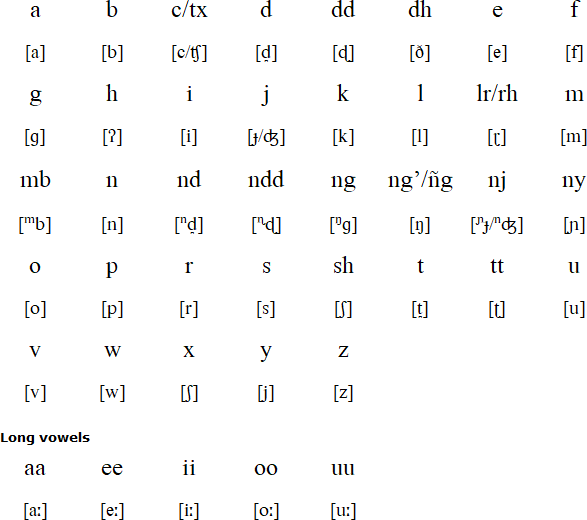Chuwabu is a Southern Bantu language spoken by about 834,000 people in the northeast of Mozambique, particularly in Zambezia province. The majority of speakers live around Quelimane in the south of Zambeiza province to the north of the Zambezi river. There are also Chuwabu speakers in other parts of Mozambique, including Maputo, the capital.
Chuwabu is also known as Chichwabo, Chuabo, Chuwabo, Chwabo, Cicuabo, Cuabo, Cuwabo, Echuabo, Echuwabo or Txuwabo. Native speakers call their language kaáfîri, which comes from the Swahili kafiri (pagan, heathen), from the Arabic كَافِر (kāfir- infidel). Dialects include Central Cuwabo, Karungu, Mayindo, Marale and Nyaringa.
Chuwabu is spoken by people of all ages, although younger people are shifting to Portuguese. Most Chuwabu children speak only Chuwabu until they start school, where they are taught in Portuguese.
The first people to write and document Chuwabu were Portuguese missionaries in the early 20th century. There are various ways to write the language with the Latin alphabet, and efforts have been made to standardise the spelling system since 1989.

Download an alphabet chart for Chuwabu (Excel)
A high tone can be indicated with an acute accent (á), a low tone with a grave accent (à), and a falling tone with a circumflex accent (â).
weéŕlegé kááy’ ddo, weéŕlegé rápaás’ ulima munddááyéː, omwaalámó naámbêdde. nuúmwáalá náámbéddéː, waavedágáː áttú wíílá amwáámele naámbéedde. kádda mútt’ úuńdh’ óóńńla : “míyó kaddiḿvódhá waaméla”
There once was a man. He cultivated his field and sowed maize. When he sowed maize, he looked for people to protect it. Everyone coming says: "I cannot protect it".
Source: A grammar of Cuwabo
Information about the Chuwabu language
https://fr.wikipedia.org/wiki/Chuwabu
https://en.wikipedia.org/wiki/Chuwabu_language
https://biblio.ugent.be/publication/8561497
https://publikationen.ub.uni-frankfurt.de/frontdoor/index/index/docId/20160
Aka, Bafaw-Balong, Bangi, Basaa, Bemba, Bembe, Bena, Benga, Bhaca, Bube, Bukusu, Bulu, Central Teke, Chichewa, Chokwe, Chuwabu, Comorian, Dciriku, Digo, Duala, Eton, Ewondo, Fang, Ganda/Luganda, Gogo, Gusii, Gwere, Haya, Hehe, Herero, Ibinda, Ikizu, Ikoma, Jita, Kabwa, Kako, Kamba, Kiga, Kikuyu, Kimbundu, Kinyarwanda, Kirundi, Kisi, Kogo, Komo, Kongo, Konjo, Koti, Kukuya, Kunda, Kuria, Kwambi, Lambya, Lingala, Loma, Lozi, Luba-Katanga, Luchazi, Lunda, Luvale, Luyana, Makaa, Makonde, Makhuwa, Mandekan, Maore, Masaaba, Mbama, Mbere, Mbukushu, Mbunda, Mbuun, Mende, Mongo, Mpiemo, Mushungulu, Mwani, Nambya, Nande, Ngoni, Ngwii, Njebi, Nkore, North Teke, Northern Ndebele (South Africa), Northern Ndebele (Zimbabwe), Northern Sotho, Nyamwezi, Nyakyusa, Nyemba, Nyole, Nyoro, Nyungwe, Nzadi, Oroko, OshiWambo, Pagibete, Punu, Ronga, Safwa, Seki, Sena, Sengele, Shona, Soga, Songe, Southern Ndebele, Southern Sotho, Sukuma, Swahili, Swati, Tanga, Tembo, Tonga, Tooro, Tshiluba, Tsonga, Tswa, Tswana, Tumbuka, Umbundu, Venda, Vili, Vwanji, Xhosa, Yakam, Yansi, Yao, Yasa, Yeyi, Zigula, Zinza, Zulu
Languages written with the Latin alphabet
Page created: 20.05.23. Last modified: 26.09.23
[top]
You can support this site by Buying Me A Coffee, and if you like what you see on this page, you can use the buttons below to share it with people you know.

If you like this site and find it useful, you can support it by making a donation via PayPal or Patreon, or by contributing in other ways. Omniglot is how I make my living.
Note: all links on this site to Amazon.com, Amazon.co.uk
and Amazon.fr
are affiliate links. This means I earn a commission if you click on any of them and buy something. So by clicking on these links you can help to support this site.
[top]